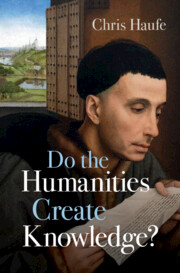Book contents
- Do the Humanities Create Knowledge?
- Do the Humanities Create Knowledge?
- Copyright page
- Dedication
- Epigraph
- Contents
- Preface
- Acknowledgments
- Chapter 1 Introduction
- Chapter 2 What Would the Community Think?
- Chapter 3 Canon and Consensus
- Chapter 4 Knowing What Matters
- Chapter 5 In Defense of How Things Seem
- Chapter 6 Reading What Lies Within
- Chapter 7 Humanities Victorious?
- Chapter 8 Of Interest
- Chapter 9 The Hoax and the Humanities
- Chapter 10 Conclusion
- References
- Index
Chapter 10 - Conclusion
Published online by Cambridge University Press: 10 November 2023
- Do the Humanities Create Knowledge?
- Do the Humanities Create Knowledge?
- Copyright page
- Dedication
- Epigraph
- Contents
- Preface
- Acknowledgments
- Chapter 1 Introduction
- Chapter 2 What Would the Community Think?
- Chapter 3 Canon and Consensus
- Chapter 4 Knowing What Matters
- Chapter 5 In Defense of How Things Seem
- Chapter 6 Reading What Lies Within
- Chapter 7 Humanities Victorious?
- Chapter 8 Of Interest
- Chapter 9 The Hoax and the Humanities
- Chapter 10 Conclusion
- References
- Index
Summary
Humanities scholarship is hard to classify as knowledge because it normally takes a form that is quite different from scientific research, which has become nearly synonymous with knowledge. Our popular picture of scientific knowledge is a based on a caricature — the Scientific Method — which misrepresents the nature of scientific inquiry in a way that makes it look fundamentally at odds with the tenor of the humanities. When we look at how scientific knowledge actually develops, however, we find that both the process by which this occurs and the structure of the scholarly communities that oversee it are surprisingly similar to those that have defined the humanities since antiquity. This book argues for a kind of knowledge — disciplinary knowledge — that is characterized by certain social practices surrounding the production of knowledge. Both the humanities and the natural sciences routinely create disciplinary knowledge.
Keywords
- Type
- Chapter
- Information
- Do the Humanities Create Knowledge? , pp. 233 - 236Publisher: Cambridge University PressPrint publication year: 2023



